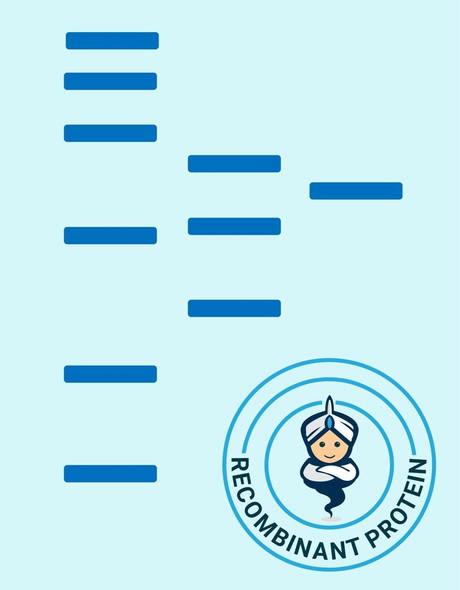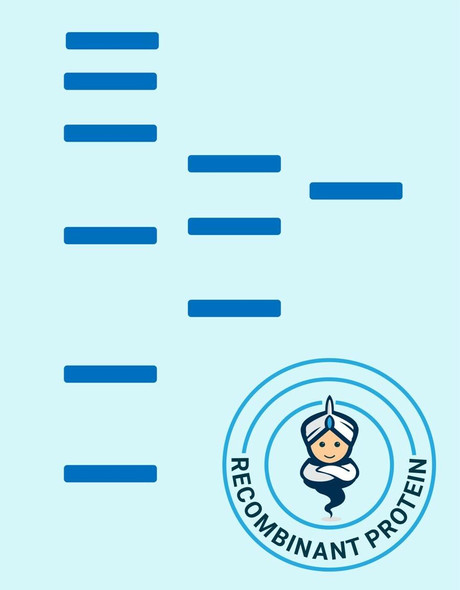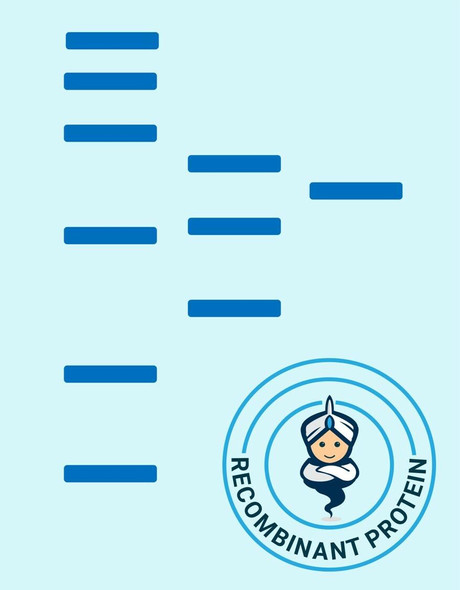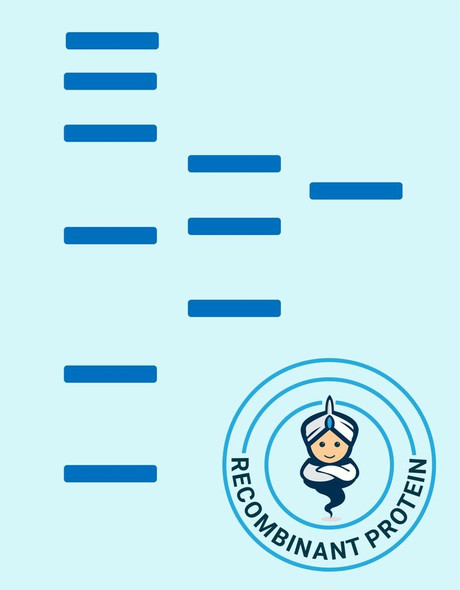Description
| Product Name: | Human IL 15 Recombinant Protein |
| Product Code: | RPPB0584 |
| Size: | 10µg |
| Species: | Human |
| Target: | IL 15 |
| Synonyms: | IL-15, MGC9721. |
| Source: | Escherichia Coli |
| Physical Appearance: | Sterile Filtered White lyophilized (freeze-dried) powder. |
| Formulation: | The protein was lyophilized from PBS pH 7.4. |
| Solubility: | It is recommended to reconstitute the lyophilized Interleukin-15 in sterile 18M?-cm H2O not less than 100�g/ml, which can then be further diluted to other aqueous solutions. |
| Stability: | Lyophilized Interleukin-15 although stable at room temperature for 3 weeks, should be stored desiccated below -18°C. Upon reconstitution IL15 should be stored at 4°C between 2-7 days and for future use below -18°C.For long term storage it is recommended to add a carrier protein (0.1% HSA or BSA).Please prevent freeze-thaw cycles. |
| Purity: | Greater than 97.0% as determined by:(a) Analysis by RP-HPLC.(b) Analysis SDS-PAGE. |
| Amino Acid Sequence: | MNWVNVISDL KKIEDLIQSM HIDATLYTES DVHPSCKVTA MKCFLLELQV ISLESGDASI HDTVENLIIL ANNSLSSNGN VTESGCKECE ELEEKNIKEF LQSFVHIVQM FINTS |
| Biological Activity: | The ED50 as determined by the dose-dependant stimulation of the proliferation of mouse CTLL-2 was found to be < 0.5 ng/ml, corresponding to a Specific Activity of 2 x 106 IU/mg. |
The protein encoded by this gene is a cytokine that regulates T and natural killer cell activation and proliferation. This cytokine and interleukine 2 share many biological activities. They are found to bind common hematopoietin receptor subunits, and may compete for the same receptor, and thus negatively regulate each other's activity. The number of CD8+ memory cells is shown to be controlled by a balance between this cytokine and IL2. This cytokine induces the activation of JAK kinases, as well as the phosphorylation and activation of transcription activators STAT3, STAT5, and STAT6. Studies of the mouse counterpart suggested that this cytokine may increase the expression of apoptosis inhibitor BCL2L1/BCL-x(L), possibly through the transcription activation activity of STAT6, and thus prevent apoptosis. Two alternatively spliced transcript variants of this gene encoding the same protein have been reported.
Interleukin-15 Human Recombinant produced in E.Coli is a single, non-glycosylated polypeptide chain containing 114 amino acids and having a molecular mass of 12.9kDa.The IL-15 is purified by proprietary chromatographic techniques.
| UniProt Protein Function: | IL15: Cytokine that stimulates the proliferation of T- lymphocytes. Stimulation by IL-15 requires interaction of IL-15 with components of IL-2R, including IL-2R beta and probably IL-2R gamma but not IL-2R alpha. Belongs to the IL-15/IL-21 family. 2 isoforms of the human protein are produced by alternative splicing. |
| UniProt Protein Details: | Protein type:Secreted, signal peptide; Secreted; Cytokine; Cell cycle regulation Chromosomal Location of Human Ortholog: 4q31 Cellular Component: nucleoplasm; Golgi apparatus; extracellular space; cell surface; membrane; integral to plasma membrane; cytoplasm; extracellular region; endosome Molecular Function:protein binding; hematopoietin/interferon-class (D200-domain) cytokine receptor binding; cytokine activity Biological Process: positive regulation of interleukin-17 production; positive regulation of immune response; positive regulation of natural killer cell proliferation; NK T cell proliferation; negative regulation of smooth muscle cell proliferation; cell maturation; signal transduction; lymph node development; positive regulation of tyrosine phosphorylation of Stat3 protein; positive regulation of natural killer cell differentiation; extrathymic T cell selection; positive regulation of tissue remodeling; skeletal muscle atrophy; cell-cell signaling; natural killer cell differentiation; positive regulation of cell proliferation; positive regulation of T cell proliferation; regulation of T cell differentiation; immune response; inflammatory response; regulation of defense response to virus by host; hyaluronan metabolic process; positive regulation of inflammatory response; aging |
| NCBI Summary: | The protein encoded by this gene is a cytokine that regulates T and natural killer cell activation and proliferation. This cytokine and interleukine 2 share many biological activities. They are found to bind common hematopoietin receptor subunits, and may compete for the same receptor, and thus negatively regulate each other's activity. The number of CD8+ memory cells is shown to be controlled by a balance between this cytokine and IL2. This cytokine induces the activation of JAK kinases, as well as the phosphorylation and activation of transcription activators STAT3, STAT5, and STAT6. Studies of the mouse counterpart suggested that this cytokine may increase the expression of apoptosis inhibitor BCL2L1/BCL-x(L), possibly through the transcription activation activity of STAT6, and thus prevent apoptosis. Alternatively spliced transcript variants of this gene have been reported. [provided by RefSeq, Feb 2011] |
| UniProt Code: | P40933 |
| NCBI GenInfo Identifier: | 729830 |
| NCBI Gene ID: | 3600 |
| NCBI Accession: | P40933.1 |
| UniProt Secondary Accession: | P40933,O00440, O43512, Q495Z8, Q6FGX7, Q93058, Q9UBA3 D3DNZ2, |
| UniProt Related Accession: | P40933 |
| Molecular Weight: | 14,912 Da |
| NCBI Full Name: | Interleukin-15 |
| NCBI Synonym Full Names: | interleukin 15 |
| NCBI Official Symbol: | IL15�� |
| NCBI Official Synonym Symbols: | IL-15�� |
| NCBI Protein Information: | interleukin-15 |
| UniProt Protein Name: | Interleukin-15 |
| Protein Family: | Interleukin |
| UniProt Gene Name: | IL15�� |
| UniProt Entry Name: | IL15_HUMAN |










